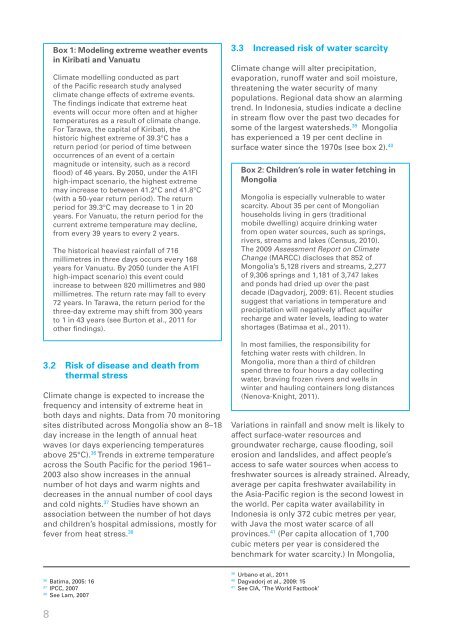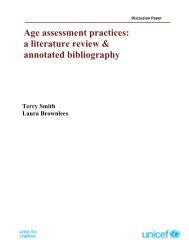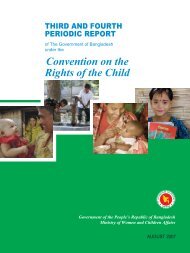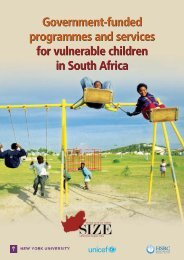Children's Vulnerability to Climate Change and Disaster ... - Unicef UK
Children's Vulnerability to Climate Change and Disaster ... - Unicef UK
Children's Vulnerability to Climate Change and Disaster ... - Unicef UK
Create successful ePaper yourself
Turn your PDF publications into a flip-book with our unique Google optimized e-Paper software.
Box 1: Modeling extreme weather events<br />
in Kiribati <strong>and</strong> Vanuatu<br />
<strong>Climate</strong> modelling conducted as part<br />
of the Pacific research study analysed<br />
climate change effects of extreme events.<br />
The findings indicate that extreme heat<br />
events will occur more often <strong>and</strong> at higher<br />
temperatures as a result of climate change.<br />
For Tarawa, the capital of Kiribati, the<br />
his<strong>to</strong>ric highest extreme of 39.3°C has a<br />
return period (or period of time between<br />
occurrences of an event of a certain<br />
magnitude or intensity, such as a record<br />
flood) of 46 years. By 2050, under the A1FI<br />
high-impact scenario, the highest extreme<br />
may increase <strong>to</strong> between 41.2°C <strong>and</strong> 41.8°C<br />
(with a 50-year return period). The return<br />
period for 39.3°C may decrease <strong>to</strong> 1 in 20<br />
years. For Vanuatu, the return period for the<br />
current extreme temperature may decline,<br />
from every 39 years <strong>to</strong> every 2 years.<br />
The his<strong>to</strong>rical heaviest rainfall of 716<br />
millimetres in three days occurs every 168<br />
years for Vanuatu. By 2050 (under the A1FI<br />
high-impact scenario) this event could<br />
increase <strong>to</strong> between 820 millimetres <strong>and</strong> 980<br />
millimetres. The return rate may fall <strong>to</strong> every<br />
72 years. In Tarawa, the return period for the<br />
three-day extreme may shift from 300 years<br />
<strong>to</strong> 1 in 43 years (see Bur<strong>to</strong>n et al., 2011 for<br />
other findings).<br />
3.2 Risk of disease <strong>and</strong> death from<br />
thermal stress<br />
<strong>Climate</strong> change is expected <strong>to</strong> increase the<br />
frequency <strong>and</strong> intensity of extreme heat in<br />
both days <strong>and</strong> nights. Data from 70 moni<strong>to</strong>ring<br />
sites distributed across Mongolia show an 8–18<br />
day increase in the length of annual heat<br />
waves (or days experiencing temperatures<br />
above 25°C). 36 Trends in extreme temperature<br />
across the South Pacific for the period 1961–<br />
2003 also show increases in the annual<br />
number of hot days <strong>and</strong> warm nights <strong>and</strong><br />
decreases in the annual number of cool days<br />
<strong>and</strong> cold nights. 37 Studies have shown an<br />
association between the number of hot days<br />
<strong>and</strong> children’s hospital admissions, mostly for<br />
fever from heat stress. 38<br />
3.3 Increased risk of water scarcity<br />
<strong>Climate</strong> change will alter precipitation,<br />
evaporation, runoff water <strong>and</strong> soil moisture,<br />
threatening the water security of many<br />
populations. Regional data show an alarming<br />
trend. In Indonesia, studies indicate a decline<br />
in stream flow over the past two decades for<br />
some of the largest watersheds. 39 Mongolia<br />
has experienced a 19 per cent decline in<br />
surface water since the 1970s (see box 2). 40<br />
Box 2: Children’s role in water fetching in<br />
Mongolia<br />
Mongolia is especially vulnerable <strong>to</strong> water<br />
scarcity. About 35 per cent of Mongolian<br />
households living in gers (traditional<br />
mobile dwelling) acquire drinking water<br />
from open water sources, such as springs,<br />
rivers, streams <strong>and</strong> lakes (Census, 2010).<br />
The 2009 Assessment Report on <strong>Climate</strong><br />
<strong>Change</strong> (MARCC) discloses that 852 of<br />
Mongolia’s 5,128 rivers <strong>and</strong> streams, 2,277<br />
of 9,306 springs <strong>and</strong> 1,181 of 3,747 lakes<br />
<strong>and</strong> ponds had dried up over the past<br />
decade (Dagvadorj, 2009: 61). Recent studies<br />
suggest that variations in temperature <strong>and</strong><br />
precipitation will negatively affect aquifer<br />
recharge <strong>and</strong> water levels, leading <strong>to</strong> water<br />
shortages (Batimaa et al., 2011).<br />
In most families, the responsibility for<br />
fetching water rests with children. In<br />
Mongolia, more than a third of children<br />
spend three <strong>to</strong> four hours a day collecting<br />
water, braving frozen rivers <strong>and</strong> wells in<br />
winter <strong>and</strong> hauling containers long distances<br />
(Nenova-Knight, 2011).<br />
Variations in rainfall <strong>and</strong> snow melt is likely <strong>to</strong><br />
affect surface-water resources <strong>and</strong><br />
groundwater recharge, cause flooding, soil<br />
erosion <strong>and</strong> l<strong>and</strong>slides, <strong>and</strong> affect people’s<br />
access <strong>to</strong> safe water sources when access <strong>to</strong><br />
freshwater sources is already strained. Already,<br />
average per capita freshwater availability in<br />
the Asia-Pacific region is the second lowest in<br />
the world. Per capita water availability in<br />
Indonesia is only 372 cubic metres per year,<br />
with Java the most water scarce of all<br />
provinces. 41 (Per capita allocation of 1,700<br />
cubic meters per year is considered the<br />
benchmark for water scarcity.) In Mongolia,<br />
36<br />
Batima, 2005: 16<br />
37<br />
IPCC, 2007<br />
38<br />
See Lam, 2007<br />
39<br />
Urbano et al., 2011<br />
40<br />
Dagvadorj et al., 2009: 15<br />
41<br />
See CIA, ‘The World Factbook’<br />
8

















